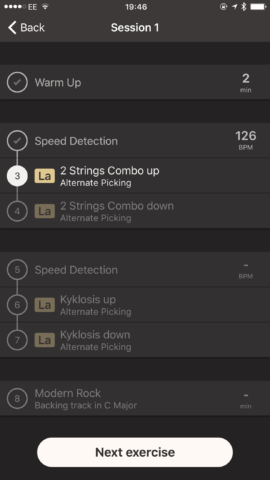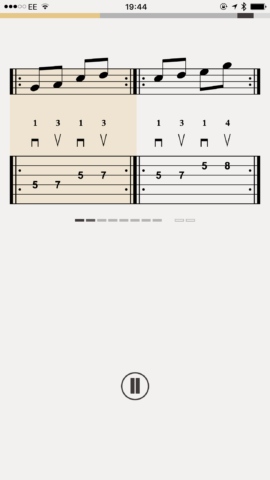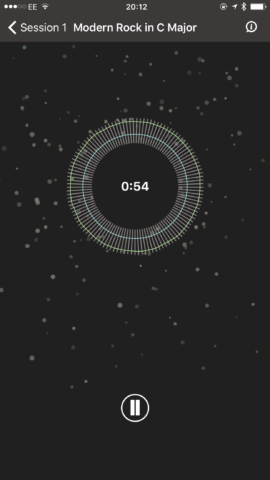An app designed to help you on your way to lead guitar stardom
Fretello is designed to help guitarists improve their technique, whether they’re an axe-wielding rock god or a musically-challenged guitar newbie. (Or, like many of us, something in between.) Its well-planned systems will teach you scales and improve your ability to improvise solos in any key, with practice routines based on “state-of-the-art musicological evidence” – you can’t argue with that!
The app recommends that you practice for 20-30 minutes around three times a week. Pretty manageable, right? Fretello breaks down a potentially intimidating task into chunks, helping you get into a regular routine. More excitingly, the app listens to you practice and adapts the lessons dynamically according to your speed and skill. Beyond telling the app whether you’re a beginner, intermediate or expert player, it uses algorithms to track your progress and tailor an ongoing set of practice routines just for you. Sounds great – but does it actually work?

Working through an eight-part practice session
Each time you sit down to practice, you’ll be working through a handful of short routines based around segments of the pentatonic scale. After a quick “speed test,” the practice tempo is set and you’re let loose on a sequence of looping scales, each mini-session lasting just a few minutes. It’ll teach various picking techniques and string combos, building your confidence piece by piece.
Unfortunately we found the speed test to be pretty useless at registering how we played, whether on an electric or acoustic guitar. Sometimes it would clock in at a paltry 40bpm, other times quadruple that, without any particular change in play. Luckily you can manually enter your preferred speed, but once its set you can’t change your mind. Likewise, although the lessons should eventually adapt, you can’t go back and change the difficulty if you’re finding things too easy or too hard. It’s a bit frustrating.
The practice sequences themselves are fine, assuming you already know how to read music or guitar tablature (both are provided). It’s fairly monotonous stuff, but hey – unfortunately that’s just what learning scales is. Repeat, repeat, repeat. It’s designed to build muscle memory and improve your speed and fluency, and we have no doubt that these techniques work. The interface is a little bland, though, and it’s not clear how far through a session you are.
Unlike more “gamey” music training apps like Yousician, Fretello doesn’t listen to see if you’re playing properly, which is weird as the app seems to imply that it does. We left the room entirely for one of the micro-sessions and it didn’t even notice we were gone. That being the case, it’s hard to see how it can really offer the dynamic feedback promised – the lessons certainly didn’t seem to adapt to anything we played.
At the end of each daily routine, your skills are tested with an improvised solo session over a backing track. These are chosen to complement the scales you’ve just practiced, and though they mainly comprise relatively short loops, they make for great accompaniment and their inclusion is a real treat. Practicing solos in this way is by far the most fun in Fretello, and really hammers home the importance of learning scales. That said, it’s a shame the app doesn’t give much in the way of tips or advice for those new to improvisation.
Despite Fretello’s insistence that it knows exactly what’s best for you with its dynamic training routines, it would be nice to have the option to go off-book with single, specific training exercises. We’d also love the addition of a “jam mode” to take advantage of the 120+ backing tracks, when you’re sick of reading scales and just want to rock out.
It’s worth noting that although the app itself is free, the course is a paid subscription service. You’ll get a few hits for free, after which the price hikes to $9.99/month. Still, that’s significantly cheaper than even a single real-life guitar lesson, and you can use it every day for that cost. We’d recommend giving the free sessions a bash if you’re on the fence, to see how you get on with this style of practice.
More experienced musicians won’t learn anything new, but may find the app a helpful, methodical practice assistant. For beginners, though, this is a great way to build confidence reading guitar tabs and playing scales. Overall, this is a decent app that has the potential to be a very useful practice aid – but unfortunately it fails to live up to its own hype.



